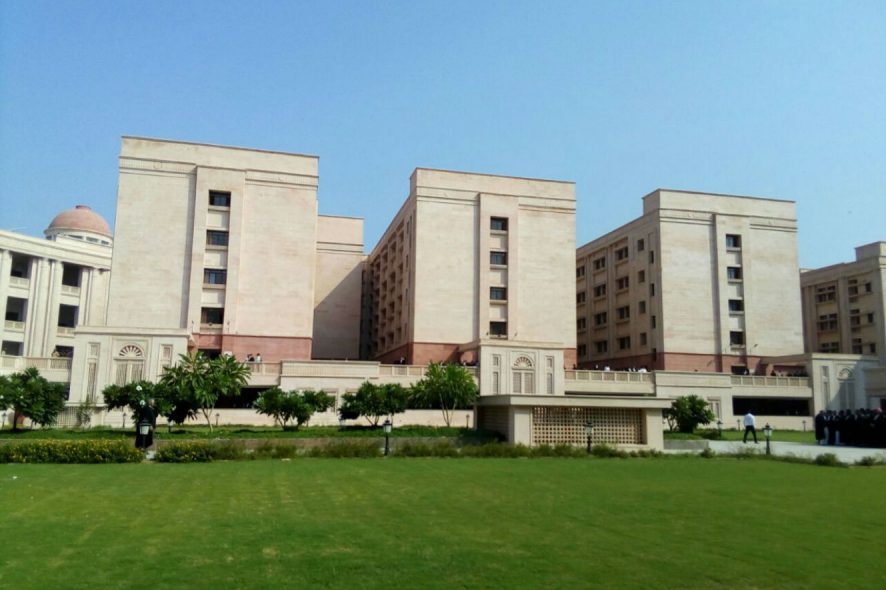Allahabad High Court: In a matter wherein the petitioner sought commissioning of a study so that history of Taj Mahal could be explored, and controversy be put to rest, the Division Bench of Devendra Upadhyaya and Subhash Vidyarthi, JJ., held that the as to which subject should be studied or researched or which topic of a particular area or discipline are not issues where this Court can be said to be possessed of any judicially manageable standards to adjudicate upon.
Proceedings in the public interest were instituted under Article 226 of the Constitution of India.
The petition sought a direction to be issued for commissioning a study in respect of the history of a monument known as Taj Mahal situated in Agra, further authorities may be directed to open the sealed doors of the approximately 22 rooms situated inside the Taj Mahal, so that alleged controversy relating to its history may be set at rest.
A declaration for declaring the parliamentary enactment namely Ancient and Historical Monuments and Archaeological Sites and Remains (Declaration of National Importance) Act, 1951 to be ultra vires the provisions of Article 19 (1) (a), 25, 26, 49 and 51-A (f) (h) of the Constitution of India to the extent the said Act declares certain monuments mentioned in the prayer clause as having been built by Mughals.
Adding to the above, a direction, particularly for ASI, was sought to open the locks of the upper and lower portions of the 4 storeyed Taj Mahal to remove all the walls built which are blocking such rooms and further to investigate scientifically and certify as to which of the two cenotaphs are fake.
Lastly, it was stated that certain directions regarding the removal of certain structures within the building be made so that historical evidence hidden inside may be brought to the surface.
Analysis and Decision
High Court held that the petitioner has called upon the Court to adjudicate and give a verdict on a completely non-justiciable issue.
The Bench stated that the power of judicial review is circumscribed by certain well recognized and established legal principles, one of such principles is the doctrine of non-justiciability.
The well-known doctrine of non-justiciability enunciates that if there are no judicially manageable standards available to a Court to adjudicate upon an issue, the petition of such a nature will not be maintainable.
Direction for opening up of rooms existing in Taj Mahal to facilitate historical study
Any historical research conducted by academicians will necessarily involve a particular methodology. Determination of the question as to which particular methodology of research would yield correct results, in our opinion, lies outside the scope of our jurisdiction and powers of judicial review.
Further, the Court added that, a writ of mandamus can be issued only in case of infringement of any right. To conduct the study and research or exploration of knowledge etc. are the subjects and issues, which, as observed above, are better to be left to the academicians, the researchers and experts of the field.
Hence, in absence of infringement of a legal right or constitutional right, Court would not be able to entertain the petition.
“Judges by experience and training are not equipped to pronounce any verdict on non-justiciable issues.”
While concluding the matter, Court held that, the Court exercising powers of judicial review may refrain itself from exercising its jurisdiction if it finds that the controversy raised before it cannot be adjudicated upon or determined on any judicially manageable and discoverable standard.
Moving to the other prayers, Court found that the 1951 Act was repealed on promulgation of The Ancient Monuments and Archaeological Sites and Remains Act, 1958. Hence, prayer made seeking a declaration that a legislation is ultra-vires, which stood repealed about 64 years ago is redundant.
In view of the above, the petition was dismissed. [Dr Rajneesh Singh v. Ministry of Culture, PIL No. 236 of 2022, decided on 12-5-2022]
Advocates before the Court:
Counsel for Petitioner:- Ram Prakash Shukla
Counsel for Respondent :- A.S.G.I.,C.S.C.






